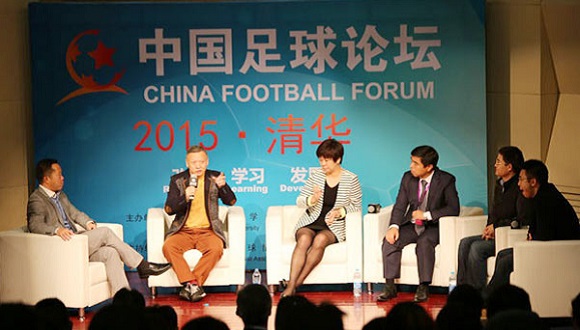Former Bayern Munich star and Germany international Nuno Gomes recently marked Chinese Super League (CSL), top tier soccer league in China, as an inappropriate league for professionals like him despite lucrative offers, triggering curiosity about when the CSL will get rid of the tag as a minted less professional league.
In an effort to bring insights to the growing soccer industry in the country, China Football Forum 2015 took place Monday in one of China’s leading universities Tsinghua University where a group of leaders, both domestic and international, in the game were in attendances. The forum attracted over 400 delegates from FIFA, CFA, La Liga, FC Barcelona and CSL in particular.
In a sharp contrast to the eye-catching record fees for the rights to the CSL, several executives of a group of CSL clubs resonate with the complaints about the inaction in implementing the soccer-related reforms.
Zhang Sihua, assistant of the general manager at Beijing Guo’an FC, was uncertain with the yet to-be-unveiled CSL’s revenues distribution scheme after the RMB8bn media deal, saying “there is too much talk and too little action in China’s soccer policy”. And the role that CSL clubs will play in setting the distribution rules are also unkown.
With dramatic increase in operating costs for CSL teams these days, most teams, whether smaller clubs or newly promoted teams, will be faced up with one major challenge, the input-output ratio. According to Wang Zhongren, an assistant manager of CSL side Henen Jianye, the operating costs for the clubs have increase to RMB250mn from RMB100mn within a year’s time. As well as for Liaoning Hongyun FC, which struggled to get rid of the relegation zone last season, “we can’t live on our own”, said their manager Huang Yan.
This partly explains the landscape of clubs, smaller clubs in particular, in Chinese top tier soccer league which has deeply impressed the country even the globe with its record broadcast fees. In addition, the existing distribution scheme will enable the CSL clubs to receive 40-50 million RMBs every year in the first two years, leaving a big gap between the affordable operating budgets and rising costs.
One of the objectives of the government-oriented soccer reform, which is highlighted by CSL’s departure with CFA, is to reestablish the sport in the country and enhance China’s presence in the sport with the help from the market and capitals. CSL clubs, which are also responsible for a large number of youth players through their academies, still have a key role to play in fulfilling the task. However, the increased broadcast revenues aren’t seen as the mere savior to the complaining CSL clubs. Accordingly, smaller clubs are calling for more action from the soccer governing body in China to implement the soccer-related reform.
Above all, China’s sports industry, including soccer, is still in its infancy and will still be troubled by the input-output ratio issue despite the sports reform. To grow the soccer industry, it needs efforts from all parties, either the government or enterprises. In complaining about the inaction of the CFA, CSL clubs are seeking for a way to change the landscape of Chinese soccer.
